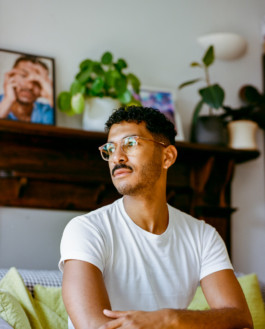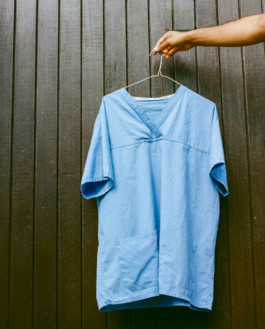Will: “It has happened to me before. It will happen to me again. It doesn’t happen to my white colleagues”


listen:
Content warning: contains descriptions of racial profiling, racism and bereavement
Photography: Myah Jeffers
Audio Producer: Rob Eagle
read:
When I put my scrubs upon, it’s a real process of changing from being at home or being not at work or being not a doctor into becoming a doctor for the day and stepping back into work and into the A&E department.
I’m Will Hunter. I am a junior doctor. I’ve been working in A&E in the South of England during the coronavirus pandemic.
I’m 26 now and my life before the pandemic was, I guess, like any young professional in London: fun, varied. I used to go out a lot, see a lot of people. I’d constantly be on the move. And then, the world literally shut down overnight.
Suddenly, the whole world that you knew – it’s just completely different. And you feel that they’ll never go back to how they were before.
Working through the pandemic has been really strange. I think the thing that struck me was how well everyone pulled together, especially at work. Just because it was such a stressful time, I think sometimes tensions can run really high. But I think what a lot of people in the NHS are very good at is finding the light in a really dark situation.
I lost a colleague to Covid, probably around the middle of the peak. His name was Peter. He was a form of paramedic that worked in my A&E department. He caught it really early on, and was really unwell with it. He had a long stay in intensive care at our hospital and then sadly passed away after a pretty long and quite hard battle with it. And that was really tough when we were told because they told us in in groups. And a colleague of mine, obviously was quite shocked, took it quite hard, and started crying, and I went to hug her. And then was told – rightly, I suppose – in a very clinical way that we weren’t allowed to do that. And it was just this… like this sudden, like, second wave of shock and anger and sadness that we’re… even with all of this, like awful news, like this thing that we were having to deal with, like the death of a colleague, that we couldn’t comfort each other. Because it wasn’t safe to do it.
The way we grieve is by comforting each other. And the way that we deal with the loss of one person is by finding closeness with other people, and especially that physical element. But that was dangerous. So how do we grieve when you can’t do any of the normal things you would do?
When you think about the numbers, you lose sight of what that actually means. And then to think about an individual, an individual case, but then all of the stuff that goes along with it, the grief and the pain and the inability to properly grieve those people. And that’s happening 46,000 times. 46,000 families and friends and all of those… the sort of magnitude of the collective loss hits home, I think, when you look at what it means just to have lost one person.
One of the things early on that struck from reading the news and from seeing who was getting it and who was dying, was the disproportionate effect that Covid was having on black and brown people here and around the world. It was a strange time. It was a melting pot, and you saw governments and institutions not doing what they could or should be doing to protect those people. And you saw governments and institutions like the police disproportionately targeting the people who are most affected by this pandemic. Then there was the murder of George Floyd in the US and there was the death of Belly Mujinga here. And those things as events sparked off the Black Lives Matter uprising that we’ve seen across the world.
I was stopped by the police on my way to work one morning. I think it was a few days after Dominic Cummings going to Durham, when that news came out and there was all the scandal about it. I was about two minutes from work and I was wearing my scrubs, probably to save a bit of time, because I was late. I saw an unmarked car behind me with its lights flashing, and just kept driving for a bit because I thought, well, I haven’t done anything so surely they’re not at me. And then it became apparent that it was for me. So I pulled into a car park just to the side of the road and a plainclothes police officer on his own got out of the car, and asked me where I was going.
At that point I made maybe the ill–advised decision to make a joke and say that I was on my way to Durham. Didn’t get a laugh from the police officer. Which may be fair enough, he’s probably heard that one a few times by that point. And then I quickly realised like: I actually need to go into semi-survival mode here because even though I haven’t done anything wrong… I mean this is an unmarked police car, a plainclothes officer; I don’t have any power here.
So what I had to do in that situation was show him my work ID and my driver’s licence to sort of confirm those things. Then a marked police car showed up and a few more officers got out. And as the other officers approached, he sort of said I was free to go because I hadn’t done anything wrong. I didn’t really ask at that time what was going on. It was only later when I reached out to the police on Twitter that I got told that they were running all licence plates randomly to see where they were registered and that because mine was registered outside of the county that I work in, that’s why they pulled me over. I then asked Surrey Police for an explanation of that. They said that that was the case. And someone else told me that it wasn’t. And that they’d run my plates because my car looked like it was a bit battered, and that they thought that maybe it was a suspicious vehicle.
I think I was a bit shaken, and I turned up to work and sort of told the story. I laughed it off a little bit and said, well, yeah, it’s happened before. And it was then that my white colleagues just sort of went ‘That’s never happened to me’. That was when the sort of shock of what had happened subsided. And then I was angry.
And yeah, I’ve pretty much stayed angry since then.
I’m unable to say whether or not I was racially profiled and pulled over because I’m black. But it happens all the time. It’s happened to me before. It will happen to me again. It doesn’t happen to my white colleagues.
Via this uprising and the Black Lives Matter movement, it feels un–ignorable now, or it feels like something that I’m going to continue being actively involved in because the world changed overnight with Coronavirus. It’s proved that the world can change quickly. And we as Black people are now demanding change, and things will not change unless we advocate for that and push forward the conversation to demand that we be treated with respect and equality.
Even if I was racially profiled, and they saw a black guy driving a car, it was black guy driving a car wearing blue hospital scrubs and a lanyard with his ID on it. And it shouldn’t be that my being a doctor legitimises my right to not be stopped by the police.
But if their question genuinely was ‘Where are you going in the middle of a pandemic?’ the fact is that I was dressed for work – I was wearing my scrub top which is very visible, very recognisable – but to the police at that moment, the most recognisable and the most important thing about me was that I was black.
An Empathy Museum project made with the support of NHS England and NHS Improvement, The Health Foundation, and Arts Council England